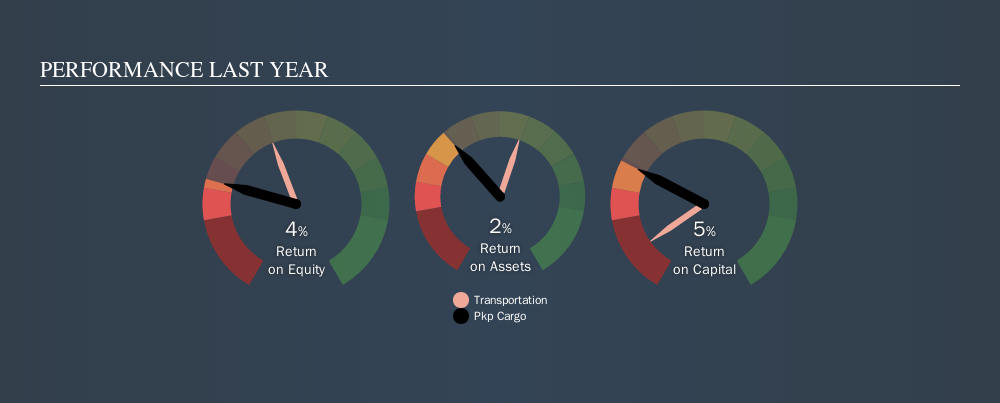- Poland
- /
- Transportation
- /
- WSE:PKP
Is Pkp Cargo S.A. (WSE:PKP) Struggling With Its 4.5% Return On Capital Employed?

Today we'll look at Pkp Cargo S.A. (WSE:PKP) and reflect on its potential as an investment. To be precise, we'll consider its Return On Capital Employed (ROCE), as that will inform our view of the quality of the business.
First of all, we'll work out how to calculate ROCE. Second, we'll look at its ROCE compared to similar companies. And finally, we'll look at how its current liabilities are impacting its ROCE.
What is Return On Capital Employed (ROCE)?
ROCE is a metric for evaluating how much pre-tax income (in percentage terms) a company earns on the capital invested in its business. In general, businesses with a higher ROCE are usually better quality. Overall, it is a valuable metric that has its flaws. Author Edwin Whiting says to be careful when comparing the ROCE of different businesses, since 'No two businesses are exactly alike.
So, How Do We Calculate ROCE?
The formula for calculating the return on capital employed is:
Return on Capital Employed = Earnings Before Interest and Tax (EBIT) ÷ (Total Assets - Current Liabilities)
Or for Pkp Cargo:
0.045 = zł276m ÷ (zł7.5b - zł1.4b) (Based on the trailing twelve months to June 2019.)
Therefore, Pkp Cargo has an ROCE of 4.5%.
View our latest analysis for Pkp Cargo
Does Pkp Cargo Have A Good ROCE?
ROCE is commonly used for comparing the performance of similar businesses. We can see Pkp Cargo's ROCE is meaningfully below the Transportation industry average of 9.5%. This performance could be negative if sustained, as it suggests the business may underperform its industry. Regardless of how Pkp Cargo stacks up against its industry, its ROCE in absolute terms is quite low (especially compared to a bank account). Readers may wish to look for more rewarding investments.
Pkp Cargo has an ROCE of 4.5%, but it didn't have an ROCE 3 years ago, since it was unprofitable. That suggests the business has returned to profitability. You can see in the image below how Pkp Cargo's ROCE compares to its industry. Click to see more on past growth.

Remember that this metric is backwards looking - it shows what has happened in the past, and does not accurately predict the future. ROCE can be misleading for companies in cyclical industries, with returns looking impressive during the boom times, but very weak during the busts. ROCE is, after all, simply a snap shot of a single year. What happens in the future is pretty important for investors, so we have prepared a free report on analyst forecasts for Pkp Cargo.
What Are Current Liabilities, And How Do They Affect Pkp Cargo's ROCE?
Current liabilities are short term bills and invoices that need to be paid in 12 months or less. Due to the way the ROCE equation works, having large bills due in the near term can make it look as though a company has less capital employed, and thus a higher ROCE than usual. To counteract this, we check if a company has high current liabilities, relative to its total assets.
Pkp Cargo has total assets of zł7.5b and current liabilities of zł1.4b. As a result, its current liabilities are equal to approximately 19% of its total assets. This is a modest level of current liabilities, which will have a limited impact on the ROCE.
The Bottom Line On Pkp Cargo's ROCE
Pkp Cargo has a poor ROCE, and there may be better investment prospects out there. But note: make sure you look for a great company, not just the first idea you come across. So take a peek at this free list of interesting companies with strong recent earnings growth (and a P/E ratio below 20).
If you like to buy stocks alongside management, then you might just love this free list of companies. (Hint: insiders have been buying them).
We aim to bring you long-term focused research analysis driven by fundamental data. Note that our analysis may not factor in the latest price-sensitive company announcements or qualitative material.
If you spot an error that warrants correction, please contact the editor at editorial-team@simplywallst.com. This article by Simply Wall St is general in nature. It does not constitute a recommendation to buy or sell any stock, and does not take account of your objectives, or your financial situation. Simply Wall St has no position in the stocks mentioned. Thank you for reading.
About WSE:PKP
Pkp Cargo
Engages in the transport of goods and the provision of logistics services in the field of rail freight in Poland and internationally.
Good value with reasonable growth potential.

